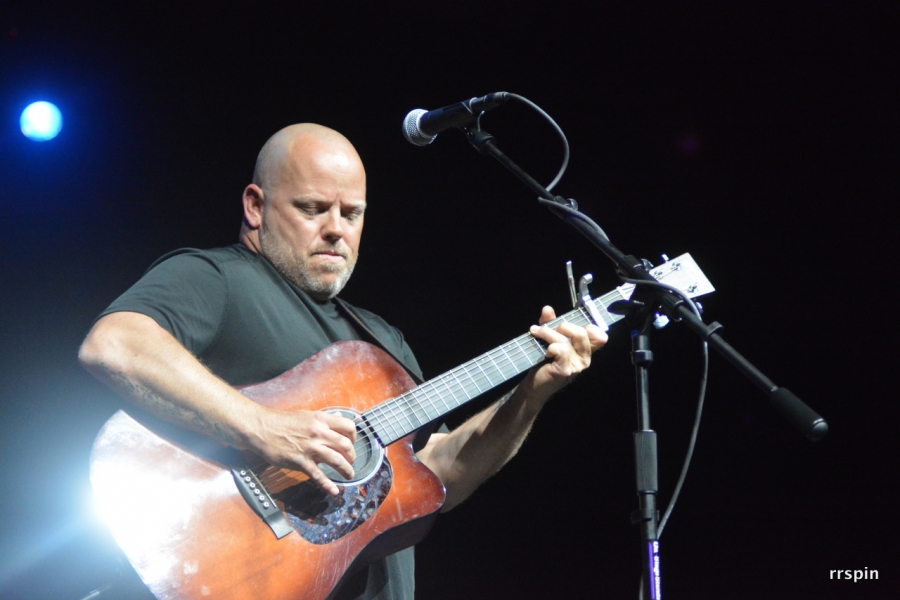And Monday night those who experienced it shared their stories at the Roanoke Rapids Theatre during a recovery summit sponsored by Halifax County Sheriff Wes Tripp and The Launch Pad.
“I used to count my dope behind the theater,” Michael Telliga, a Roanoke Rapids native now living in Wilmington said as he briefly told his story between his musical sets before the main program began. “It's good to come back and not have chemicals over your head and your parents wanting to have you back in the house. The disease of addiction affects everybody. My recovery is my responsibility.”
(A photo gallery is available for viewing at this link. For a related story, follow this link)
Telliga told the audience he has been clean since 2012 and told law enforcement present, “I'm glad you arrested me because I about killed myself.”
Telliga praised the work of another Roanoke Rapids native — Wayne Ray, who runs The Launch Pad in Wilmington. “If it wasn't for Wayne and Launch Pad, I'd probably be dead or my parents would be dead.”

Mike Chavis was a trooper in the state Highway Patrol, a boyhood dream he saw become reality.
He graduated Elon and was accepted into the academy.
Beginning his career in the district which encompasses Pasquotank and Camden counties, he led that district in DWI arrests and was eventually promoted to sergeant. “I was the youngest sergeant in Robeson County,” he said. “On the way to the top I started experiencing jet lag. I started having problems after problems.”
Drinking made the problems go away. The problem was, he said, “It got more progressive.”
He decided to quit on the day of his granddaughter's birth. “I moved to Wilmington. I lost my home, my wife of 22 years left me. I lost my standing in the community.”
Through it all, Chavis said, he learned, “We do recover. We do recover. Give yourself 90 days.”
Chavis reveled in being “the man,” the trooper who was given a Mustang as his patrol car, but the shooting death of Trooper Ray Worley in Halifax County made him take note of the seriousness of his job. “I knew right then it wasn't all fun and games.”
Now opening his home up as a place for addicts, Chavis asked, “What are you doing about recovery where you live.”

For George H., it all starts with one day.
He had been clean for many years, but one day, “I forgot what I was. I quit hanging out with you guys,” he said, referring to fellow addicts. “I was calling on God to please help me. It was really about being open and honest.”
There were times he was called Crackhead George and the last day he used his wife caught him getting high. His youngest child told him, “'I hate your guts. I wish you'd die.'”
Then it happened. “My family, my business was in shambles. Normal people don't understand addiction. I was shunned from church. I was committed to go on a spiritual journey.”
The thing about those in recovery, George said, is, “We don't judge, we don't stereotype. I asked what can I do to help. Recovery is about surrendering everything.”
The answer in his spiritual journey, he said, was, “God said, 'I want you to bring Jesus Christ to addicts.' Jesus didn't hang out with people who talk about Jesus. We're supposed to love others, don't put stipulations on who we love or don't love.”
Putting recovery first, George said, “A lot of amazing things happen. I've seen it grow and change. I've seen it change the church. You have to be open.”

John Shinholser has been clean since 1982 and is spreading the recovery message through jail programs.
In his message, his addresses the stigma attached to addiction. “There are 23 million people in recovery, but you can be assured there's another 23 million who need to be in recovery.”
While the government has appropriated $1 billion for Zika research, Shinholser noted, “We're losing 49,000 a year and can't get a nickel. If this was a cancer rally this place would be filled. In 2016 we're coming out of the dark ages.”
Shinholser, who operates the McShin Foundation in Richmond, said, “I go around and try to educate. We have to go to any length to make our community better.”
He said recovery summits need to be held every year. “When the sheriff reaches out to the recovery community, he's doing something right.”








